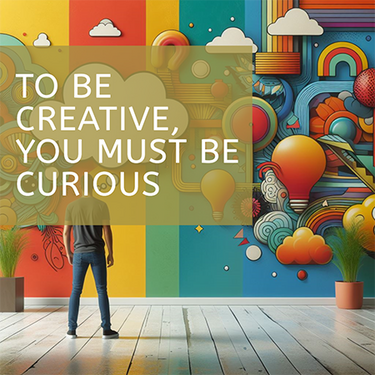
Creativity is an extraordinary human faculty that allows us to invent, imagine, and create. However, to unleash our full creative potential, it is essential to cultivate curiosity. In this article, we will explore the close relationship between curiosity and creativity, as well as strategies to foster it in our daily lives.
Creativity is a valued quality in all areas of life, from art and science to business and everyday problem-solving. Being able to think innovatively and find original solutions is an invaluable skill in a world constantly changing and evolving.
Curiosity, on the other hand, is the innate drive that leads us to explore, discover, and learn about the world around us. It is the spark that ignites the fire of creativity, fueling our imagination and motivating us to seek new answers and solutions.
What is creativity?
Creativity is the ability to generate original and useful ideas that solve problems or meet needs. It goes beyond mere artistic ability and manifests in various forms, from creating works of art to solving complex problems in the scientific field.
Curiosity as a driving force of creativity
Curiosity is the fuel that drives the engine of creativity. It urges us to question the status quo, explore new horizons, and seek answers to seemingly impossible questions. When we are curious, we are open to new experiences and perspectives, allowing us to think more flexibly and creatively.
Benefits of being curious
Cultivating curiosity has numerous benefits for our minds and overall well-being. It stimulates our minds, keeping us mentally agile and alert. Additionally, it helps broaden our horizons, expanding our knowledge and understanding of the world around us.
How to foster curiosity
There are some ways to foster curiosity in our daily lives. One of the most effective ways is to keep an open mind and be receptive to new ideas and experiences. We can also foster curiosity by experimenting with new things and challenging our preconceived assumptions.
Curiosity as a tool to overcome creative obstacles
When faced with a creative block, curiosity can be our best ally. By questioning our assumptions and exploring new possibilities, we can find inspiration in unexpected places and discover innovative solutions to our problems.
Practical exercises to develop curiosity
There are several exercises we can do to develop our curiosity. Active observation, for example, encourages us to pay attention to details and question what we take for granted. Similarly, diverse reading exposes us to new ideas and perspectives, stimulating our minds and feeding our curiosity.
The importance of error in the creative process
It is important to understand that error is a natural and necessary part of the creative process. Often, it is through our mistakes and failures that we learn and grow. By adopting an attitude of experimentation and accepting the risk of making mistakes, we can unleash our creativity and discover new possibilities.
Curiosity and problem-solving
Curiosity can also be a powerful tool for problem-solving. By asking unusual questions and exploring new perspectives, we can find innovative solutions to seemingly insurmountable challenges. Lateral thinking and creativity allow us to see problems from different angles and find unique and effective solutions.
Curiosity as a source of inspiration
Curiosity invites us to explore the world around us and discover new ideas and inspiration. By remaining open and receptive to new experiences, we can find inspiration in the most unexpected places and make connections between seemingly unrelated ideas.
Examples of creative and curious people
Many of history’s most creative minds were also notably curious people. Leonardo da Vinci, for example, was known for his insatiable curiosity and desire to explore all aspects of the natural world. Marie Curie, on the other hand, was driven by a deep curiosity about the world of science and discovery. Steve Jobs, the visionary co-founder of Apple, was also known for his insatiable curiosity and ability to see the world from new perspectives.
Practical applications in everyday life
Curiosity is not only important in major scientific and artistic advances but also in our daily lives. Fostering curiosity can lead to greater innovation in work, as well as personal enrichment and greater satisfaction with life in general.
Curiosity and lifelong learning
Curiosity is essential for lifelong learning and personal growth. By maintaining a constant attitude of seeking and never stopping questioning, we can continue learning and growing throughout our lives.
Tips for keeping curiosity alive
To keep our curiosity alive, it is important to explore different hobbies, interests, and areas of study. We can also foster curiosity by engaging in conversations with people from different backgrounds and perspectives, allowing us to see the world from new and exciting perspectives.
In conclusion, curiosity is an essential ingredient for creativity. By cultivating our curiosity and maintaining an open and receptive mind, we can unlock our creative potential and find new and exciting ways of thinking and living. So the next time you find yourself seeking inspiration, remember: to be creative, you must first be curious.
Thanks for reading me,
Jhamile Abuabara
